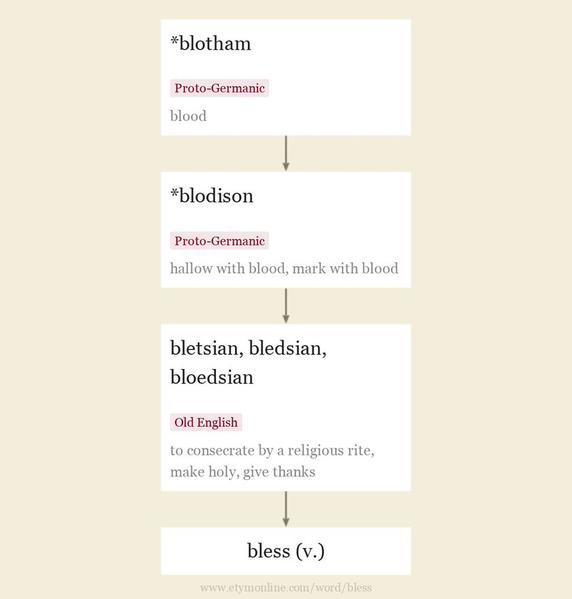bless v.祝福;頌揚=praise=glorify
【例】Bless the Lord. 感謝主。 Bless this house! 願上帝保佑這個家﹗
Bless my soul! 謝天謝地﹗ Bless me! 天哪!
【區】bliss ( n.極樂 ) ,一個是動詞,一個是名詞。
音似:補蕾絲
媽媽幫女兒蓋上蕾絲面絲,祝福她婚姻幸福
【詞源】
中古英語blessen, 源自古英語bletsian,bledsian, 諾森伯蘭bloedsian“通過宗教儀式奉獻,使神聖,表示感謝”,來自原始日耳曼語*blodison“用血神聖,用血標記”,來自*blotham“血”(見blood(n.))。最初是灑在異教祭壇上的血。
這個詞在古英語聖經中被選來翻譯拉丁語benedicere和希臘語eulogein,兩者都有“說好話,讚美”的基本含義,但在聖經中被用來翻譯希伯來語brk“彎曲(膝蓋)、崇拜、讚美、祈求祝福。” LR Palmer(《拉丁語言》)寫道:“一個原本表示特殊儀式行為的詞,其語義發展為‘犧牲’、‘崇拜’、‘祝福’等更廣義的含義,這並不奇怪。”比較拉丁語immolare(看immolate)。
在古英語晚期,其含義通過與不相關的相似而轉變為“發音或使快樂、繁榮或幸運”bliss。“祈求或宣告上帝的祝福”的意思是從 14 世紀早期開始的。在其他語言中沒有同源詞。有關的:Blessed;blessing。
原文:
Middle English blessen, from Old English bletsian, bledsian, Northumbrian bloedsian "to consecrate by a religious rite, make holy, give thanks," from Proto-Germanic *blodison "hallow with blood, mark with blood," from *blotham "blood" (see blood (n.)). Originally a blood sprinkling on pagan altars.
This word was chosen in Old English bibles to translate Latin benedicere and Greek eulogein, both of which have a ground sense of "to speak well of, to praise," but were used in Scripture to translate Hebrew brk "to bend (the knee), worship, praise, invoke blessings." L.R. Palmer ("The Latin Language") writes, "There is nothing surprising in the semantic development of a word denoting originally a special ritual act into the more generalized meanings to 'sacrifice,' 'worship,' 'bless,' " and he compares Latin immolare (see immolate).
The meaning shifted in late Old English toward "pronounce or make happy, prosperous, or fortunate" by resemblance to unrelated bliss. The meaning "invoke or pronounce God's blessing upon" is from early 14c. No cognates in other languages. Related: Blessed; blessing.
圖片來源:
修改於: 2023-08-15 20:03:29